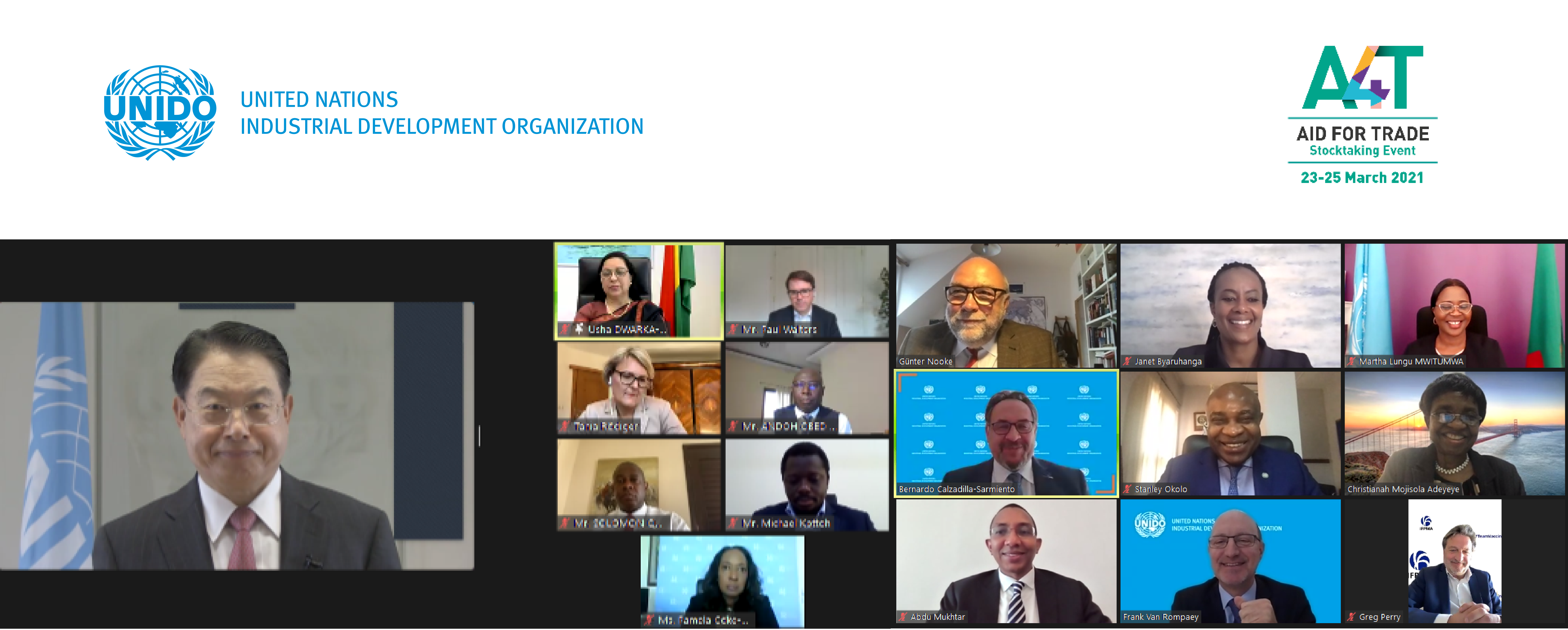UNIDO at the WTO 2021 Aid for Trade Stocktaking event
23 March 2021

GENEVA, 23-25 March 2021 – Taking stock of the impact of the COVID-19 pandemic on trade and development, and charting a new way forward for the WTO-led Aid for Trade Initiative were the main objectives of a virtual event taking place from 23 to 25 March.
In this framework, the United Nations Industrial Development Organization (UNIDO) held two webinar sessions, one on “Mobilizing Resources to Build Resilient Local Pharmaceutical Manufacturing Industries in Developing Countries - Challenges and Opportunities”, with the Permanent Mission of Zambia, and another on “Implementing the AfCFTA: the Need for Deepening Private Sector Engagement and Commitment”, jointly with the African Development Bank (AfDB) and the International Trade Centre (ITC).
The first session generated a rich discussion on the critical issue of strengthening local production of essential medicines and vaccines in Africa, with all panellists agreeing that supporting the development of this sector in Africa needs to be a priority.
“The case for building local pharmaceutical production in developing countries has never been made more clearly as during this pandemic”, observed Günter Nooke, Personal Representative of German Chancellor, Angela Merkel, who also referred to Germany’s past cooperation with UNIDO which, inter alia, resulted in the Pharmaceutical Manufacturing Plan for Africa (PMPA).
A common thread mentioned by many was the continent´s heavy reliance on imports for essential medicines and vaccines. This was identified as being a security of supply risk that has been highlighted during the COVID19 crisis. It was noted that the vast majority of inputs are now imported, with the vaccine-situation being even more stark - counting only a few manufacturing sites in Africa; hence the need to develop more regionalized value chains.
The African Continental Free Trade Area (AfCFTA) session, in turn, focused on ways of getting the private sector more involved in policy dialogues on trade, investment and infrastructure, and highlighted the need for greater partnerships to attract investment in local promising industries.
The AfCFTA, which came into force on 1 January 2021, brings together 1.3 billion Africans in a US$3.4 trillion economic bloc. The bloc is the largest free trade area since the establishment of the World Trade Organization, and economists project that its benefits and impacts could lift tens of millions out of poverty over the next 15 years.
During the discussion, AfDB Vice-President, Solomon Quaynor, highlighted UNIDO’s efforts in attracting investments and engaging with the private sector at the continental, regional, and sub-national level to facilitate the African business community’s access to the new single market.
Speakers emphasized the need to place the private sector at the heart of the AfCFTA process, especially with the launch of phase two of the negotiations (Competition Policy, Intellectual Property Rights, Investments, and E-commerce), and stressed the importance of the Aid for Trade Initiative in supporting a successful implementation of the new Agreement. They called upon UNIDO, AfDB, and ITC to continue working together towards the increased participation of the private sector in the AfCFTA.
For further information, contact:
Frank van Rompaey, UNIDO Geneva